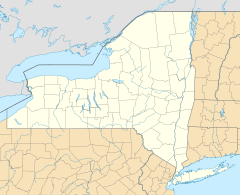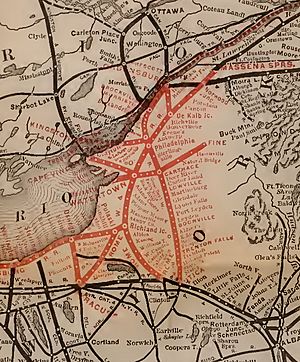Clayton (village), New York facts for kids
Quick facts for kids
Clayton, New York
|
|
|---|---|
| Country | United States |
| State | New York |
| County | Jefferson |
| Town | Clayton |
| Area | |
| • Total | 2.58 sq mi (6.67 km2) |
| • Land | 1.60 sq mi (4.15 km2) |
| • Water | 0.97 sq mi (2.52 km2) |
| Elevation | 276 ft (84 m) |
| Population
(2020)
|
|
| • Total | 1,705 |
| • Density | 1,064.29/sq mi (410.85/km2) |
| Time zone | UTC-5 (Eastern (EST)) |
| • Summer (DST) | UTC-4 (EDT) |
| ZIP code |
13624
|
| Area code(s) | 315 |
| FIPS code | 36-16089 |
| GNIS feature ID | 0946809 |
Clayton is a lovely village in New York. It's part of the larger town of Clayton in Jefferson County. In 2020, about 1,705 people called Clayton home.
This village is famous for its Antique Boat Museum. It also has the historic Clayton Opera House. Many people visit Clayton in the summer. They enjoy its art galleries, unique shops, and great services.
Contents
History of Clayton Village
The area where Clayton is now was first home to Algonquian tribes. Later, the Iroquois tribes lived here. Digs near Clayton show that around 1470, a village with 2-3 longhouses and about 180 people existed. It was protected by a fence called a palisade.
The community had other names before "Clayton." It was once called "French Creek" and "Cornelia." By 1853, 426 people lived here. Clayton officially became a village in 1872 after its citizens voted for it. A big change happened in 1873 when the railroad arrived. This helped the local tourism grow a lot.
Two important places in Clayton are listed on the National Register of Historic Places. These are the Clayton Historic District and the Capt. Simon Johnston House. These places help preserve the village's past.
Geography of Clayton
Clayton is located in a beautiful spot. It sits right on the south bank of the St. Lawrence River. This river forms part of the border between the United States and Canada.
To the west of the village is French Creek Bay. This is where French Creek flows into the St. Lawrence River. Across the river from Clayton is Grindstone Island. This is one of the many large islands in the famous Thousand Islands region.
The village covers about 2.58 square miles (6.7 square kilometers). A good part of this area, about 0.97 square miles (2.5 square kilometers), is water.
Roads in Clayton
Two important roads meet in Clayton. New York State Route 12 crosses New York State Route 12E right in the village.
- NY-12 goes south about 22 miles to Watertown. Watertown is the main city in Jefferson County.
- NY-12 also goes northeast for about 11 miles. It runs along the St. Lawrence River to Alexandria Bay.
- NY-12E heads southwest along the St. Lawrence River for about 15 miles to Cape Vincent.
Population Changes in Clayton
| Historical population | |||
|---|---|---|---|
| Census | Pop. | %± | |
| 1870 | 1,020 | — | |
| 1880 | 1,621 | 58.9% | |
| 1890 | 1,748 | 7.8% | |
| 1900 | 1,913 | 9.4% | |
| 1910 | 1,941 | 1.5% | |
| 1920 | 1,849 | −4.7% | |
| 1930 | 1,940 | 4.9% | |
| 1940 | 1,999 | 3.0% | |
| 1950 | 1,981 | −0.9% | |
| 1960 | 1,996 | 0.8% | |
| 1970 | 1,970 | −1.3% | |
| 1980 | 1,816 | −7.8% | |
| 1990 | 2,160 | 18.9% | |
| 2000 | 1,821 | −15.7% | |
| 2010 | 1,978 | 8.6% | |
| 2020 | 1,705 | −13.8% | |
| U.S. Decennial Census | |||
The population of Clayton has changed over the years. In 2000, there were 1,821 people living in the village. There were 828 households. About 26.9% of these households had children under 18.
The average age of people in Clayton in 2000 was 41 years old. About 22.6% of the population was under 18. And 20.9% of the population was 65 years or older.
Transportation in Clayton
You can easily get to Clayton by car. Just take New York State Route 12. If you are on Interstate 81, take Exit 50S to Route 12.
Railroad History
Starting in 1873, Clayton had train service. It was part of the Rome, Watertown and Ogdensburg Railroad (RW&O). This railroad later became part of the New York Central network. At its busiest, many express trains came to Clayton every day. They brought passengers and goods from places like Niagara Falls and Grand Central Terminal.
Clayton's train station was a key spot. It was the main way to get to the Thousand Islands region by ferry. The railroad had a train yard and a place to store locomotives. You could even take a direct sleeping car train to Clayton.
Passenger train service to Utica stopped in 1950. Freight service continued until 1972. After that, the train tracks were removed.
Modern Transportation Changes
The old train station and ferry terminal are now Frink Park. This is a public space for shows and for boats to dock. The old rail yards became part of a snowplow factory. That factory was taken down in 2010.
Now, a hotel stands where the factory used to be. It was finished in 2013. The rest of the old train path in the village is now a walking and biking trail. It's called the Sissy Danforth Rivergate Trail.
Education
The schools in Clayton are part of the Thousand Islands Central School District.
See also
 In Spanish: Clayton (villa) para niños
In Spanish: Clayton (villa) para niños
 | Delilah Pierce |
 | Gordon Parks |
 | Augusta Savage |
 | Charles Ethan Porter |




